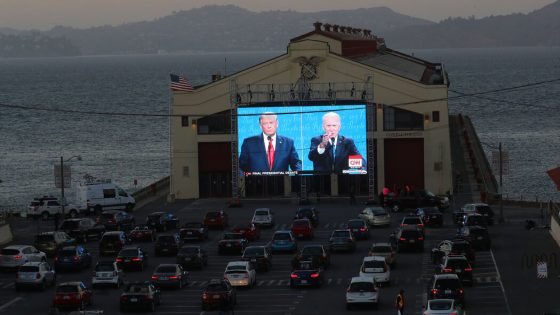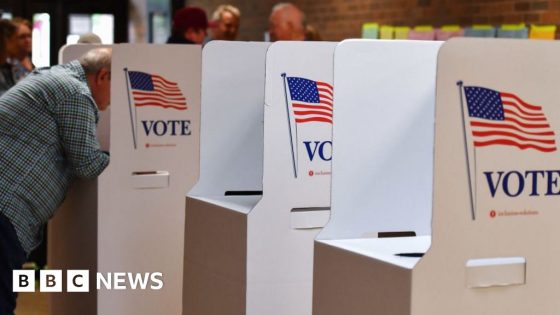Talking points
All eyes will be on CNN at 9 p.m. Eastern, when President Biden and Donald Trump face off in their first debate since 2020. Among the keenest watchers will be executives and investors looking for signs about how the candidates might handle the economy and business in a second term.
There will be plenty to scrutinize in the 90-minute, audience-free debate, including what the candidates say and how they say it. Here’s what we will be looking out for. (And, for a lighter take, check out our debate “bingo card” further below.)
The economy is the big question. Various measures show strong growth under Biden, but many voters feel differently. What will Biden and Trump say about some of the key issues?
-
Inflation: This is clearly a challenge for the president, as Americans complain about what they’re paying in the grocery store, at the pump and on their rent. Biden can say that price increases are slowing down, and will most likely emphasize his administration’s efforts to crack down on “corporate greed,” like taking on so-called junk fees. Trump will probably stress how good things were when he took office in 2017 — an economy many Americans want back.
-
Taxes: Biden’s proposals for higher corporate taxes will hit profits: “It’s simple math,” David Bahnsen, the founder and chief investment officer of the Bahnsen Group, told DealBook. Many business leaders don’t like Biden’s plan to increase taxes on the wealthy, either. Trump will probably stress his desire to extend his 2017 tax cuts and lower the corporate rate to 20 percent. But questions about corporate earnings and the economy may eclipse those concerns.
-
Protectionism: Both candidates want to increase tariffs on Chinese goods, but Biden has been more targeted in how he has done it during his presidency. Trump has proposed significantly higher across-the-board levies, though it’s unclear how serious he is about it. Economists have warned that Trump’s potential approach could aggravate inflation and hurt the economy.
-
Markets: The S&P 500 set 31 records this year; investors will hope neither party messes with that momentum. In Thursday night’s debate, “markets probably care more about presentation than policy pledges,” Paul Donovan, an economist at UBS, wrote in a client note. Biden may have a slight edge, he added, since investors would prefer keeping “some continuity.”
Other issues will probably feature prominently. Biden will most likely raise abortion rights, a topic that has helped Democrats win in recent elections. Trump will almost certainly speak a lot about immigration, perhaps his most potent issue — and one that many, including Elon Musk, say is a failure of Biden’s.
The intangibles will matter. Executives told DealBook that C.E.O.s will be paying attention to how Biden and Trump perform:
-
For Biden, 81, an important issue for business leaders and many voters is whether he is still fit to serve. A sharp, forceful performance could go a ways in quieting any concerns.
-
For Trump, 78, competence is a question as well. But his demeanor will also be under scrutiny, especially if he comes across as overly abrasive or erratic. Some executives said their feelings would come down to whether they can stomach another four years of a Trump presidency.
There’s also the show around the show. Trump has suggested that his potential running mate would be in Atlanta for the debate. The Times reports that his list is narrowing, with Senator J.D. Vance of Ohio, Gov. Doug Burgum of North Dakota and Senator Marco Rubio of Florida being of particular interest.
The pick may matter a great deal to Trump’s campaign: The Republican megadonor Ken Griffin has said the choice could influence whether he opens up his wallet for Trump.
HERE’S WHAT’S HAPPENING
The Fed gives America’s biggest lenders a clean bill of health. The central bank’s latest stress tests showed that major institutions could survive even extreme economic conditions, including a plunge in the value of the dollar and the collapse of their biggest clients. The results may strengthen banks’ arguments that capital requirements shouldn’t be raised, as regulators plan on doing.
SpaceX reportedly plans to sell shares at a nearly $210 billion valuation. Elon Musk’s rocket company raised its valuation — which is up 16 percent from December — in the tender offer after stronger-than-expected investor demand, according to Bloomberg. That level sets a record for a privately held American start-up, and trails only the $268 billion of ByteDance, the Chinese owner of TikTok.
Boeing faces accusations from another whistle-blower. A subcontractor who worked on the 787 Dreamliner said he faced retaliation after pointing out what he said were “substandard manufacturing and maintenance practices.” Separately, Boeing said it had achieved significant quality improvements in the production of the 737 Max after one such plane lost a panel during a flight in January.
Amazon joins the $2 trillion club. The tech giant is now in the company of Alphabet, Apple, Microsoft and Nvidia, as investors bet on its efforts to capitalize on the artificial intelligence boom and its cost-cutting efforts. Separately, Amazon is reportedly planning to compete with low-cost rivals by introducing a Temu-esque service that ships cheap goods directly from China, according to The Information.
A welcome cool-down?
A late-winter rise in inflation appears to have cooled off this spring. A key data point set to be released on Friday will confirm whether this trend has held up, and what that might mean for interest rates.
S&P 500 futures were trading slightly lower this morning after a small gain on Wednesday, as investors await the Personal Consumption Expenditures price index, the Fed’s preferred inflation measure.
Economists expect to see an improvement in May P.C.E. numbers. That would be notable, given that a lower-than-expected Consumer Price Index report this month also suggested that the Fed’s interest rate policy was stifling demand, and suppressing inflation.
Here’s what to watch for:
-
Core P.C.E., which excludes volatile food and fuel prices, is forecast to come in at 2.6 percent on an annualized basis. That would be 0.2 percentage points lower than April’s reading, but still above the Fed’s 2 percent target.
-
Analysts will look for signs that so-called shelter inflation, which tracks housing, is easing. There’s still tightness in that market, but there are also indications that prospective home buyers are putting off purchases as mortgage rates are sky-high.
-
Consumer goods prices have edged lower over the year, a trend that is expected to be confirmed in the report. One example: Last week’s retail sales report showed that consumers were pulling back, underscoring what companies like Target, Walmart and Kohl’s have said about their lower-income customers.
-
Services inflation could be a wild card. Economists are seeing evidence that demand for airfares, hotels and restaurant bookings aren’t growing at the torrid pace of a year ago. But the summer travel season has only just begun, and Carnival, the cruise ship operator, this week reported strong results and an upbeat outlook.
A cool reading could lift the stock market. Wall Street is divided over whether the Fed will join other central banks in lowering borrowing costs.
Futures traders are pricing in a roughly 60 percent chance of a September cut, but Fed officials say they need more evidence that consumer prices are in retreat before taking action.
Big Tech wins in court
The Supreme Court just gave the Biden administration and Big Tech another legal victory, rejecting a lawsuit that had accused government officials of pressuring social media companies to censor conservative content. It was one of several cases that could have big consequences for how tech giants are regulated.
How we got here: Biden administration officials had urged social media companies like Facebook and X, then called Twitter, to remove what it said was misinformation on Covid-19 vaccines and claims of election fraud related to the 2020 contest. In 2022, the attorneys general of Louisiana and Missouri, both Republicans, along with three doctors and a right-wing website that traffics in conspiracy theories accused the government of coercing the companies to muzzle conservative content.
Last year, a Trump-appointed judge in Louisiana ruled against the administration, issuing an injunction that limited government communications with social media companies about content.
The Supreme Court disagreed. In a 6-to-3 ruling, the majority said the plaintiffs had failed to prove harm. They also rejected the censorship claims outright, saying that the companies acted on their own.
Justices expressed unease about how the executive branch communicates. From the majority opinion, written by Justice Amy Coney Barrett:
The plaintiffs, without any concrete link between their injuries and the defendants’ conduct, ask us to conduct a review of the yearslong communications between dozens of federal officials, across different agencies, with different social media platforms, about different topics. This court’s standing doctrine prevents us from exercising such general legal oversight of the other branches of government.
It’s the latest Supreme Court ruling on how Big Tech polices content. Last year, the court rejected two cases that would have limited the scope of Section 230 of the Communications Decency Act. That measure gives companies immunity for user content posted on their sites and allows them to remove information they deem offensive.
Big Tech says it is crucial to the open internet. Critics counter that Section 230 has been wrongly used to shield the companies from legal claims.
What next? The Supreme Court is expected to rule on a separate social media case about laws in Florida and Texas that limit social media companies’ ability to delete conservative content. Justices have already expressed wariness about the state laws.
A debate bingo card
Those tuning into the debate will probably hear plenty about policy, age and consumer prices. Here are some of the terms, references and zingers we’ll be listening for. Call it the DealBook debate bingo card:
-
“Shrinkflation.” President Biden brought his reduced-packaging gripe to Americans around this year’s Super Bowl.
-
Crypto. Donald Trump has courted the industry, which has benefited from an impressive rally this year — and is determined to knock off crypto-skeptic candidates.
-
“Inflation nightmare.” That’s how Trump has summed up the issue, pinning the blame squarely on his opponent.
-
Nobel Prize. Biden got a strong endorsement this week from 16 Nobel Prize-winning economists who have warned that Trumponomics could lead to Trump-flation.
Did we miss any? Let us know.
THE SPEED READ
Deals
-
The German engineering company Bosch is reportedly considering a takeover bid for Whirlpool, an American rival in appliances. (Reuters)
-
SoftBank’s Vision Fund 2 is said to be investing in Perplexity AI, a search engine powered by artificial intelligence, at a $3 billion valuation. (Bloomberg)
Elections, politics and policy
-
South by Southwest, the popular festival in Austin, Texas, said the U.S. Army and weapons manufacturers wouldn’t sponsor next year’s event amid pushback against their presence over their support for Israel’s handling of the war in Gaza. (SXSW, NYT)
-
Jordan Bardella, the far-right leader who could become prime minister, says he would cut taxes and France’s contribution to the European Union by 2 billion euros ($2.1 billion). (FT)
Best of the rest
We’d like your feedback! Please email thoughts and suggestions to [email protected].
Source Agencies



